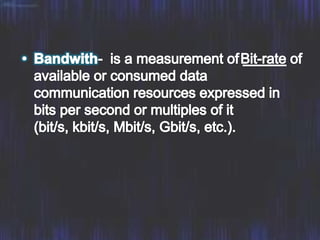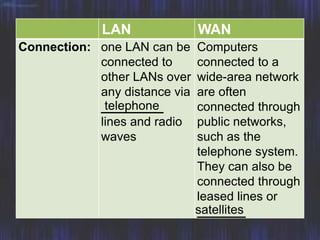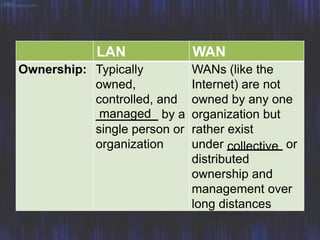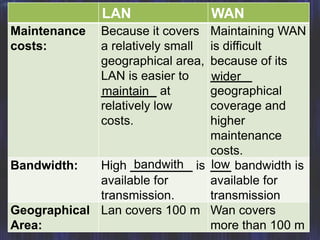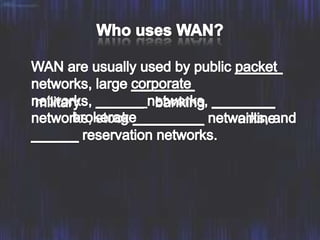Wan report
- 11. LAN Definition: LAN (Local Area WAN WAN (Wide Area Network) is a Network) is a computer network computer network broad covering a that covers a _____ small geographic area (e.g., any area, like a home, network whose office, schools, or communications group links _____ of _____ cross buildings. metropolitan, regional, or national boundaries over a long distance
- 12. LAN Speed: high speed(1000mbps) Data transfer LANs have a rates: ____ data transfer high rate Example: WAN less speed(150mbps) WANs have a lower data transfer rate as compared to ____ LANs Internet Network in an _______ is a ____________ can good example of organization be a LAN a WAN
- 13. LAN Technology: Tend to use certain connectivity technologies, primarily _______and Ethernet ____ Token Ring WAN WANs tend to use technology like MPLS ATM _____, ____, _____ Frame Relay and X.25 ____ for connectivity over the longer distances
- 14. LAN Connection: one LAN can be connected to other LANs over any distance via telephone _________ lines and radio waves WAN Computers connected to a wide-area network are often connected through public networks, such as the telephone system. They can also be connected through leased lines or satellites _______
- 15. LAN Components: WAN layer 2 devices like switches, bridges. layer1 devices like hubs ____, _________ repeaters Layers 3 routers devices ______, Multi-layer __________ Switches and Technology specific devices like ATM or Frame-relay Switches etc.
- 16. LAN Fault Tolerance: Data Transmission Error: WAN LANs tend to have _____ fewer problems associated with them, as there are a smaller amount of systems to deal with. Experiences fewer data transmission ___________ errors WANs tend to be less fault tolerant as it consists of a large amount of systems _______ there is a lower amount of fault tolerance. Experiences more ____ data transmission errors as compared to LAN
- 17. LAN Ownership: Typically owned, controlled, and managed _________ by a single person or organization WAN WANs (like the Internet) are not owned by any one organization but rather exist under ________ or collective distributed ownership and management over long distances
- 18. LAN Set-up costs: If there is a need to set-up a couple of extra devices _______ on the network, it is not very expensive to do that WAN In this case since networks in remote areas have to be connected hence the set-up costs are higher. However WANs using public networks can be setup very cheaply, just software _________ (VPN etc)
- 19. LAN Geographical Have a small Spread: __________ geographical range and do not need any leased telecommunication lines WAN Have a large geographical range generally ________ across spreading boundaries and need leased telecommunication lines
- 20. LAN Maintenance costs: Because it covers a relatively small geographical area, LAN is easier to ________ at maintain relatively low costs. WAN Maintaining WAN is difficult because of its ______ wider geographical coverage and higher maintenance costs. bandwith low Bandwidth: High _________ is ___ bandwidth is available for available for transmission. transmission Geographical Lan covers 100 m Wan covers Area: more than 100 m
- 23. • Covers a large geographical area so long distance _________ can connect on the one network • software and resources with _________ workstations • Messages can be very quickly to anyone else on the network. These messages can have pictures, sounds, or data included with them (called ).
- 24. • Expensive things (such as printers or phone lines to the internet) can be shared by all the computers on the network without having to buy a different for each computer. • Everyone on the network can use the data. This avoids problems where some users may have older information than others. • Share information/files over a larger ____ • network cover
- 25. • Are and generally ____ • Need a good to restrict outsiders from entering and the network • Setting up a network can be an expensive and complicated . The bigger the network the more expensive it is.
- 26. • Security is a real issue when many different people have the ability to use information from other computers. Protection against ______ and adds more complexity and expense. • Once set up, maintaining a network is a ______ job which requires network supervisors and technicians to be employed.
- 27. • Information may not meet local or interests • to hackers or other outside threats
- 28. Thank you for listening!! Johny A. Prudencio III-BLIS








